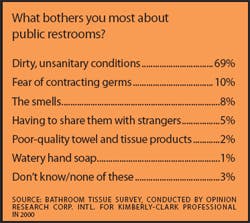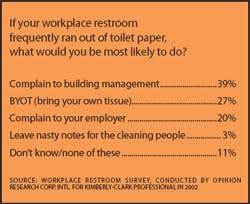By Jana J. Madsen
If cleanliness is next to godliness, then a negative restroom experience really can be hell. Dirty surfaces, broken fixtures, vandalized partitions, empty dispensers, and lingering odors can make users want to turn and run.
A poorly maintained restroom leaves a lasting impression and often conveys to tenants, staff, customers, and visitors that building management simply doesn't care. "Problems in the restroom are one of the things that building owners/operators will get the most complaints [about]," says Richard Thorne, director of the washroom business, North America, Kimberly-Clark Professional, Roswell, GA.
Clean restrooms that function well result in less headaches and more-satisfied users - a win-win for everyone. "A washroom that is planned to meet the occupancy use and the type of individuals that are using the washroom does a number of things: It is easier to maintain, it looks better, and it portrays a better building image," says Dennis Redman, marketing manager, Bobrick Washroom Equipment Inc., North Hollywood, CA.
Selecting appropriate washroom accessories can remedy many restroom-related complaints. In addition to weighing preferences for environmentally friendly products and hands-free dispensing systems, you should keep the following in mind as you outfit new or existing restrooms with new technology, consumables (toilet paper, paper towels, soap, etc.), and dispensing systems.
Image
It's important that your facility's washrooms project the same image as the rest of the building and business. In environments where prestige is important, aesthetics are a major determinant during the procurement of washroom accessories. Facilities management professionals are less concerned about vandal resistance and price when image is on the line.
Luxury finishes such as granite and marble are common. For toilet partitions and paper-dispensing systems, it's hard to match the beauty of stainless steel.
For handwashing, counter-mounted soap-dispensing systems are preferable. Because the reservoir of soap remains hidden underneath the vanity, the discreet design of counter-mounted dispensers makes them the frontrunner in high-end restrooms.
Avoid the industrial look that bulky toilet-paper-dispensing systems can lend; single-roll toilet tissue is ideal. "In a prestigious environment, you want toilet-paper dispensers that are very similar to what you have at home or you might find in a nice hotel," says Redman. If capacity is a concern, install a dispenser with two single rolls, or use coreless tissue.
If creating a home-like feel is important to you, opt for paper towels instead of a hand dryer. Folded towels are the most-popular option (vs. rolled towels) because the dispenser is more compact.
Maintenance/Janitorial Service
A small crew, high turnover among janitorial staff, and/or a lean maintenance budget make careful selection of washroom accessories even more important.
Keeping washrooms stocked with soap, toilet tissue, and paper towels is essential. High-capacity consumables reduce labor because janitorial staff don't need to refill them as often. Using jumbo-roll toilet tissue, paper towels on a roll, and wall-mounted soap dispensers (which hold more than counter-mounted dispensers) decrease the chances of run-out. "If you have an inconsistent maintenance staff or a skeleton crew that only has a chance to go in every other day or twice a week, you better have a multi-roll or jumbo-roll dispenser," says Menomonee Falls, WI-based Bradley Corp.'s Director of Marketing and New Product Development Jon Dommisse about toilet tissue.
To reduce the volume of trash and frequency of removal, consider warm-air hand dryers. These machines eliminate the waste created by paper towels and offer a reliable hand-drying method that doesn't depend on restocking.
Make sure janitorial staff are aware of proper restocking procedures, understand how to maintain automatic hands-free systems, and know which cleaning agents to use on certain surfaces. For example, if harsh, abrasive cleansers are used on automatic faucets, the sensor window could become scratched and reduce the faucet's ability to activate when users are present.
To make maintenance easier, consider installing a coordinated family of washroom accessories. This reduces the amount of keys necessary to unlock dispensing systems, making restocking consumables quicker and easier for janitorial staff.
Amount of Use
A heavily trafficked restroom has special requirements. High-capacity consumables are a must, and consideration of traffic patterns is extremely important. Paper-towel dispensers and warm-air hand dryers should be placed just off of the sink area to minimize water dripping from just-washed hands. "Dryers should always be placed in a direct traffic flow line so that it's sink-to-dryer-to-exit," explains Dommisse. While the ratio of sinks to hand dryers is typically 2:1, it's recommended that one hand dryer be supplied for every wash basin in heavily used restrooms.
If paper towels are preferred, use a high-capacity roll towel system. Unlike folded towels, which can sometimes release multiple towels when one is dispensed, roll towels provide users with a controlled amount each time. As a result, there are less wasted towels, less litter, and less maintenance. A typical roll of towels is 800 feet or more.
Jumbo-roll or multiple rolls of toilet tissue in a dispenser are the best option for high-volume washrooms. For a restroom with moderate traffic where single-roll tissue is preferred, coreless tissue offers more sheets per roll without the look of a bulky dispenser.
Wall-mounted soap dispensers are ideal for washrooms with high traffic. As opposed to counter-mounted dispensers, they offer a greater capacity. According to Thorne, "Typically speaking, below-the-counter systems have anywhere between 500 mil to 800 mil available to dispense, whereas most above-the-counter systems are at least a liter, maybe even more." Products with a see-through window make it easy for cleaning crews to see when soap is low.
Type of Facility & Users
Office workers, football fans, and families - restrooms must meet all of their individual needs. Consideration of facility use and types of users is critical to providing a positive restroom experience. Washroom accessories should be purchased with this in mind.
For example, warm-air hand dryers can be ideal for facilities with transient populations, such as airports, stadiums, and malls. New, faster-drying machines are cutting the dry time significantly. The only downfall is their loudness. "We recommend them for areas where speed is important, but quiet is not. For instance, quiet is not important at Great America Theme Park or O'Hare Airport," says Catherine Sibley, key account manager, World Dryer Corp., Berkeley, IL. "But, quiet may be important if you're in a library."
If the restroom is located just off a pool or spa area, or in another high-humidity environment, avoid partitions made of plastic laminate (it will peel), baked enamel (it will rust from the inside out), or stainless steel. The best materials for partitions in these environments are phenolic and solid plastic (also known as high-density polyethylene, or HDPE).
Washrooms in public facilities where children are present should provide multi-height products. "Bathrooms designed for adults are great if you're taller than 5-feet, 7 inches. But, try bringing two kids in and holding them up to the sink so that they don't have to touch something," says Dommisse. "Or try to get them to reach a hand dryer when it's too high. All the water on the child's hands falls on the floor and then they slip. Washroom safety is paramount to building managers."
Additionally, both women's and men's restrooms in businesses catering to families should be equipped with a diaper-changing station. "It's also highly recommended that you put a child's seat in the barrier-free toilet compartment (which is normally a little larger)," says Redman. Adults can strap a small child in the seat while using the bathroom.
Likelihood of Vandalism
If restroom users tend to be destructive, expect to sacrifice aesthetics for industrial-grade washroom accessories and expect to pay for performance. Wise initial planning and the purchase of durable products can mean less hassle (and expense) later.
Hand dryers are the ideal substitute for paper towels in vandalism-prone washrooms. Their rugged construction (often made with stainless-steel or cast-iron covers) makes them virtually indestructible, and by purchasing a unit with the nozzle fixed in a downward position, tampering is nearly impossible. According to Sibley, "The fixed nozzle is a wonderful vandal-resistant feature, preventing misguided users from experimenting with turning the nozzle upwards to pour liquids into the dryer." Because paper towels are often used by vandals to clog toilets, hand dryers cut down on the otherwise-expensive plumbing repair costs.
To facilities professionals, keeping partition surfaces graffiti-free is a top priority. Certain materials can be cleaned easier and are more resistant to damage than others. Good choices include phenolic partitions because scratches can be repaired with laminate filler and solid plastic (or HDPE) partitions, which are dent-proof and make cleaning graffiti as easy as wiping it away. "If you stand back, take a running charge, and run into them, you're probably not going to hurt them," says Redman.
How the partitions are installed is equally important. "Ceiling-hung partitions are definitely not the way to go if you have high vandalism. If you have a couple of kids pushing, they'll come down," says Dommisse. To ensure the partitions can withstand even the greatest abuse, install them with multiple points of contact - braced overhead, to adjacent walls, and/or the floor and ceiling. "Overhead braced is the most durable (and probably the least costly) configuration," Redman shares.
Cost
Hands-free washroom fixtures and accessories please everyone from parents to medical professionals and every germaphobe in between. Beware, though, that automatic technology means an initial price increase. However, hygiene isn't the only reason it's worth the expense. Automatic dispensing gives building owners and facilities professionals control over the quantity of consumables being used. For example, battery-operated paper-towel dispensers provide a preset amount of roll towel to each user. If the user desires more, the unit pauses before releasing an additional quantity. This pause discourages users from taking more.
Warm-air hand dryers are another washroom accessory that offers a no-touch option. Not surprisingly, automatic (sensor-operated) units are more costly than pushbutton (timer-operated) units. Hand dryers also eliminate the continuous cost of paper towels and the amount of waste they generate. According to one manufacturer, a hand dryer can save more than 90 percent of paper-towel costs with a low initial investment.
While not all automatic dispensers are battery operated, the majority have yet to be hard-wired into a building's electrical infrastructure. Therefore, the life-cycle cost of these units should include the expense of replacement batteries.
If you want to keep your partitions looking new longer, prepare to pay more upfront. HDPE partitions cost two- to three-times as much as baked enamel (metal) partitions, but withstand abuse and can be cleaned of graffiti exceptionally well by comparison.
Jana J. Madsen ([email protected]) is managing editor at Buildings magazine.




